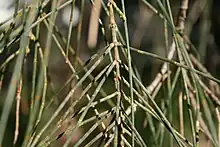cladode
English
.jpg.webp)
cladodes of Ruscus are leaf-like and photosynthetic

The photosynthetic stems of the Allocasuarina are not leaf-like, however still considered cladodes.

cladodes of Opuntia are flattened stems
Etymology
From New Latin cladodium, from Ancient Greek κλᾰ́δος (kládos, “young slip of a tree”).[1]
Noun
cladode (plural cladodes)
Translations
See also
- phylloclade — a leaflike cladode, with unlimited extension growth
References
- “cladode”, in Merriam-Webster Online Dictionary, Springfield, Mass.: Merriam-Webster, 1996–present.
- Acquisition and Diversification of Cladodes: Leaf-Like Organs in the Genus Asparagus
This article is issued from Wiktionary. The text is licensed under Creative Commons - Attribution - Sharealike. Additional terms may apply for the media files.